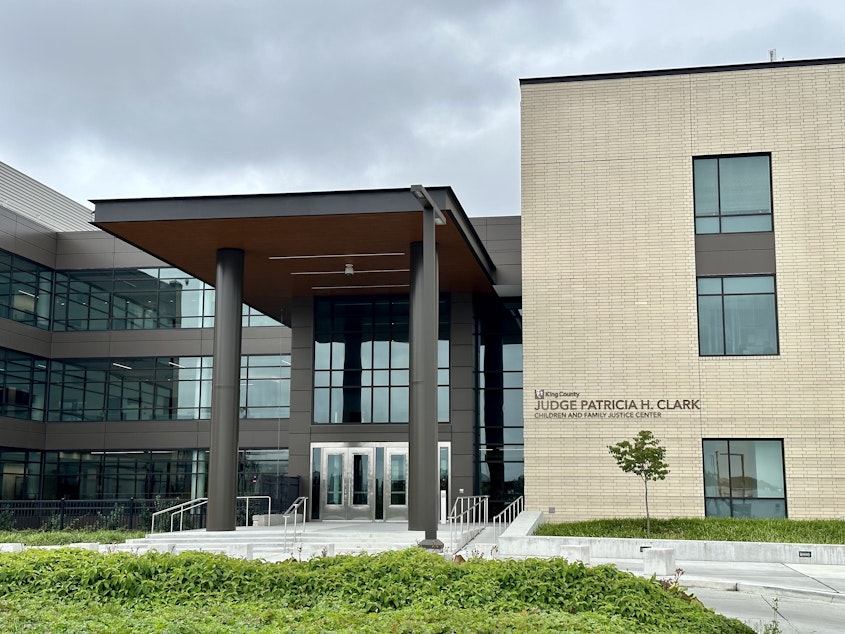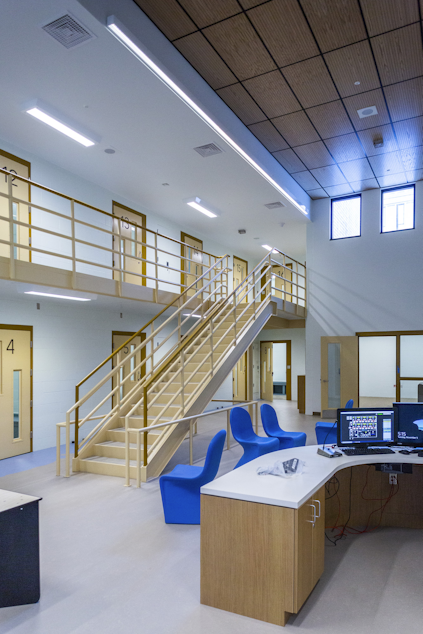Group homes would replace youth jail in King County under plan to close detention center

King County would replace its youth jail with a receiving center and network of group homes under recommendations from an advisory committee sent to the county council Wednesday.
It’s the first plan announced for how the county might replace its controversial youth detention facility, which opened in 2020.
The proposal calls for a 24-hour receiving and respite center where young people facing serious criminal charges would go upon booking, then stay for up to three days or until their first court hearing. The advisory committee did not agree on whether the facility would be locked, and said further discussion was needed.
Youth deemed higher risk and not released to their families would then be placed in community care homes to await trial. The security level of the group homes would vary, with some higher security and others being “staff secured” — that is, relying on staff, not locked doors, to keep youth from leaving.
Each would house between one and five young people, and be located within neighborhoods in urban and rural areas across the county. The homes would be operated by community organizations with county oversight.
In 2020, the same year a new juvenile detention center opened in the county, County Executive Dow Constantine responded to “No New Youth Jail” protests by pledging to end secure detention for youth by 2025, calling it a “system rooted in oppression.”
Protesters had called for an end to juvenile incarceration, pointing to the disproportionate number of youth of color, especially Black youth, in the criminal legal system.
Sponsored
“Study after study shows that youth incarceration is a system that does not work. The profound racial disparities in the youth criminal legal system are a result of racist realities embedded in many systems, from health care to educational to economic, as well as the legal system itself,” Constantine said on Wednesday. “Together we can create bold and comprehensive change that can ensure healing, accountability, and community safety.”
In submitting the new recommendations, Constantine acknowledged that the initial timeline was not feasible, and that 2028 is the earliest the new system could begin to roll out.
The recommendations follow nearly two years of work by the county’s 14-member Care and Closure Advisory Committee, which included representatives from the public defender’s office, court, prosecutor’s office, advocates and youth who have gone through the criminal legal system. The committee held numerous community meetings and focus groups and heard from about 1,800 residents.
Members of the committee said the process was disjointed and that little progress was made in the initial months. Consensus was hard to find on many issues, and the committee ultimately aligned only on the less contentious aspects of the plan, like providing support and resources for youth who await trial at home, not in detention.
“Those recommendations are not unanimous,” said King County Superior Court Judge Patrick Oishi, who represented the court on the advisory committee.
Sponsored
“We do not believe that these un-secure respite centers would be sufficient to ensure public safety for the community,” Oishi said. He said it is “a significant separation of powers issue” for the executive branch to determine whether juveniles facing criminal charges should be securely detained.
“It's actually the court’s responsibility, and the judges’ in juvenile court, to make release decisions,” Oishi said.
Oishi said the court does not think the plan would comply with a state law that requires counties to have secure detention for juveniles awaiting trial.
That’s surmountable, said King County Councilmember Claudia Balducci, who is vice-chair of the Law & Justice Committee.
“We may have to ask for some changes to the law. That's not unusual when you try to do something new,” Balducci said.
Sponsored
Balducci called the process "thoughtful" and "inclusive" and said the process involved consultation with a variety of groups and people in the criminal legal system.
“We ended up with recommendations that are actionable and implementable and likely to work,” Balducci said.
The executive’s office plans to spend the next year holding community town halls and other events to discuss the proposal. The Care and Closure Advisory Committee has been given until January 2025 to work out details — especially regarding security levels — for the receiving and respite center and community care homes.

In the meantime, the county plans to propose improvements to the current youth detention system, where high turnover and understaffing has led to lockdowns and canceled classes and visits in recent months.
Sponsored
The recommendations come at a time when juvenile incarceration is on the rise in King County after years of steep decline. In the past 15 years, a shift in how juvenile crime is handled means youth are only jailed for more serious offenses. However, a spike in juvenile crime rates led to a 61% increase in juvenile bookings in 2023, including for car theft, violent crime, gun possession, and burglary.




